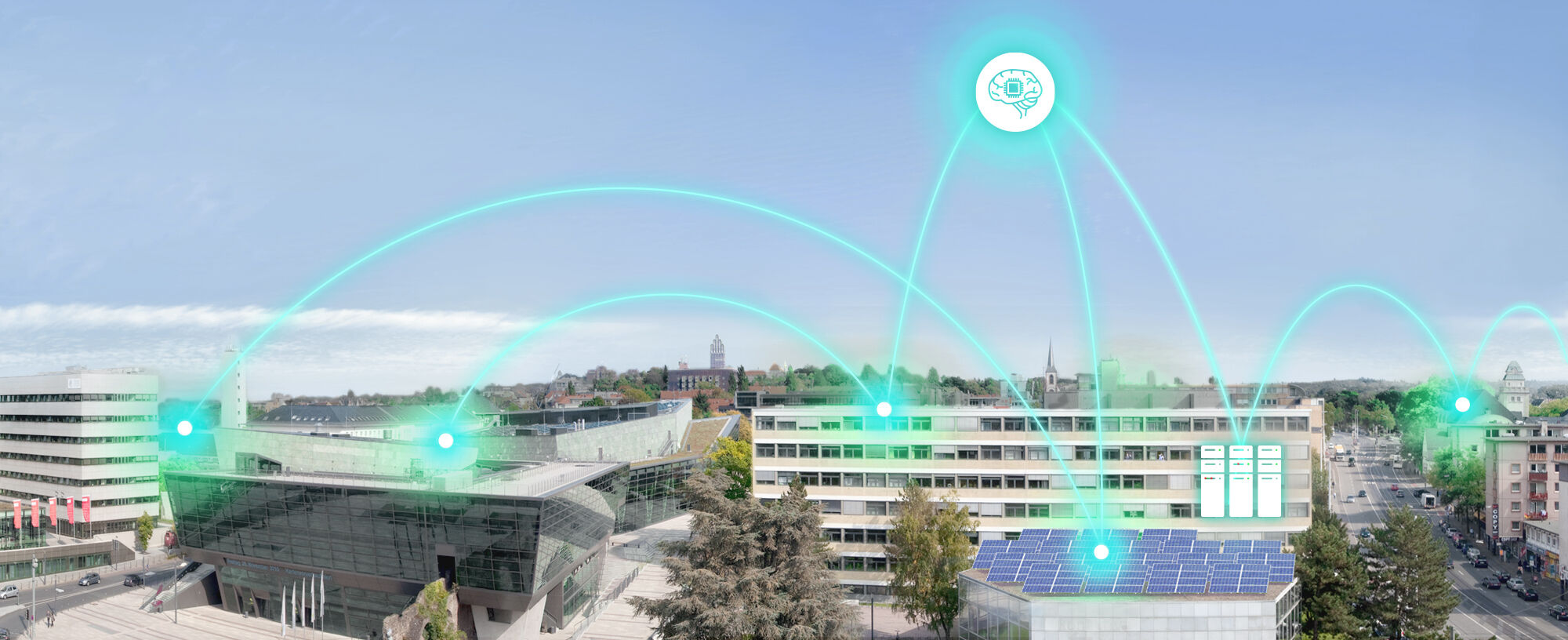Running theses and research assistant jobs
Project seminar
Student: Benjamin Seeger
Supervisor: Julia Barbosa
Time period: 10/01/2024 - 01/10/2025
Type: Project Seminars Bachelor
The decarbonization of energy systems can be achieved with the integration of renewable energy (RE) sources, and the joint analysis of the different energy forms that comprise an energy system can lead to more cost efficient RE integration strategies. An increasing complexity in the energy markets can hence be expected as new players and new strategies emerge. In this context, local energy markets are an object of study, since they can reduce the barriers to entry for new small players, such as rooftop photovoltaic owners and waster heat recovery units. Under the assumption of a perfect market, one can show that the selfish optimization of each player leads to the maximization of the total welfare. Due to the reduced number of market participants, the same is not valid in local energy markets. It has been shown in previous work [1], that diversifying the energy mix within a local thermo-electric energy market and/or adding a price cap can help improve negative social welfare effects arising from the imperfect competition. Additionally, even though only analyzing local electricity markets, Seeger has shown in [2] that the existing connection between different regions should be considered since they do impact the market outcome in each region even in cases where no energy is actually transported in the transmission grid. In this Project Seminar an existing Nash-Cournot game formulation for local thermo-electric energy markets (LTEEM) will be to be further developed and applied to evaluate the potential of using storage as market regulator agents.
Student: Luisa Emrich
Supervisor: Andrew Eliseev
Time period: 09/17/2024 - 03/05/2025
Type: Project Seminars Bachelor
The lack of real data for distribution grids is a long-standing problem in the electrical engineering community that has been raised at major scientific events. Internal non-disclosure policies of energy operators, privacy regulations and lack of political push for openness and transparency leads to the information about public infrastructure being unavailable to the public. This situation results in a status quo in which researchers are forced to test their hypotheses on standard synthetic test cases. This, however, does not allow them to obtain statistically significant observations (the number of popular synthetic cases is limited) or to test the performance of the methods developed (the size of synthetic cases is too small compared to the real grids). Thus, the creation of a massive dataset with (at least partially) true data will lead to significant improvements in the quality of research in power systems. Thankfully, the French national distribution system operator ENEDIS published the topology of the French medium-voltage grids for the entire metropolitan France (except Grenoble) under a very permissive open licence. In the recent months, Energy Information Networks & Systems department of the Technical University of Darmstadt developed a framework that allows to retrieve and automatically process the ENEDIS topology data for a desired administrative unit (such as, e.g. a particular town) of France. The access to the framework is restricted and will be granted at the start of the work on this project seminar topic.
Student: Alex Christ
Supervisor: Kirill Kuroptev
Time period: 11/14/2024 - 04/14/2025
Type: Project Seminars Bachelor
Reimplementation of the implicit enumeration algorithm, proposed by Scaparra and Church, and its application to a power line interdiction problem. Scaparra, M. P., & Church, R. L. (2008). A bilevel mixed-integer program for critical infrastructure protection planning. Computers & Operations Research, 35(6), 1905-1923. doi.org/10.1016/j.cor.2006.09.019
Bachelor theses
Student: Jan Niklas Witt
Supervisor: Sina Hajikazemi
Time period: 08/01/2023 - 02/01/2024
Type: Bachelor Thesis
Energy Planning Models (EPMs) are critical tools for simulating and guiding decisions about multimodal energy systems in specific regions or countries. These models provide strategies to meet future demands and environmental targets, which are often used by large energy companies to negotiate with the government and other investors. However, there is a concern that these profit-driven companies may manipulate the input data of EPMs to align with their interests.
This problem can be modeled as a bilevel linear programming problem, with linear lower and upper-level problems. Although bilevel programming problems are challenging in general, there are algorithms that can effectively solve them in the linear upper and lower-level form.
In this bachelor thesis, the student will develop interesting and interpretable examples of this problem for real-world EPMs that are relevant to current debates in energy policy. The goal is to show the potential impact of adversarial attacks on EPMs and to highlight the importance of developing robust models that are resistant to such attacks. The developed examples can be used as case studies to illustrate the impact of this problem on energy policy decisions and raise awareness among stakeholders in the energy sector. Requirements
• Proficiency in python programming
• Understanding of the fundamentals of mathematical programming
• Familiarity with energy planning models
• Experience with mathematical programming languages
Student: Mika Wittenberger
Supervisor: Hans Stenglein
Time period: 05/12/2025 - 10/13/2025
Type: Bachelor Thesis
Die steigende Verfügbarkeit von PV-Anlangen insbesondere bei Haushalten, die traditionell als Verbraucher im elektrischen Netzwerk angesehen werden, kann eine Herausforderung für die Kontrolle des elektrischen Netzwerks darstellen. Dabei kommt es häufig zu der Situation, dass die Haushalte nicht mehr nur Energie verbrauchen, sondern netto dezentral produzieren. Dies führt dazu, dass der Strom im elektrischen Netz nicht mehr in eine fixierte Richtung fließt, sondern bidirektional. Im Rahmen dieser Arbeit soll dieses Verhalten basierend auf der erwartbaren Leistungsflussrichtung in Python modelliert werden, um daraufhin lokale topologische Eigenschaften des resultierenden gerichteten Graphenen, wie bspw. den Knotengrad, für verschiedene Situationen in realen Netzwerken zu untersuchen. Die Fragestellung ist dann, wie sich die Verteilung dieser topologischen Eigenschaften qualitativ verändert, je nach der aktuellen Situation der verteilten Energieresourcen.
Student: Niyu Tong
Supervisor: Andreas Bott
Time period: 04/22/2024 - 09/25/2024
Type: Bachelor Thesis
Design and implementation of evaluation algorithms for optimizing the Preload Loss Test (PLT)
Student: Ran Bi
Supervisor: Julia Barbosa
Time period: 06/10/2025 - 11/09/2025
Type: Bachelor Thesis
Modeling the energy system of a country as large and diverse as China presents significant challenges due to its vast geographic scale, regional disparities in energy resources, complex infrastructure, and rapidly evolving energy mix. This bachelor thesis contributes to the development of an open data model of the Chinese energy system, aiming to provide a transparent and adaptable foundation for energy system analysis. By addressing data inconsistencies, integrating multiple regional datasets, and representing the structural complexity of the system, the thesis supports efforts to build a robust model that can serve as a basis for future research and scenario analysis.
Master theses
Student: Fazeel Muhammad
Supervisor: Sina Hajikazemi
Time period: 03/01/2025 - 08/31/2025
Type: Master Thesis
Energy planning models are essential for analyzing energy and climate policies at national and global scales. However, these models face various uncertainties, categorized into uncertainties in input parameters, such as future fuel prices, and uncertainties in the structure of the model, such as the complexities and constraints inherent in different technologies. While methods such as global sensitivity analysis, stochastic programming, and Monte Carlo simulation address parameter uncertainties, they often overlook uncertainties in the model structure. In addition, policymakers are faced with considerations outside the scope of conventional modeling, such as political feasibility, regulatory challenges, and the timing of actions. As a result, policymakers may choose feasible but suboptimal solutions due to the challenges of quantifying intangibles in energy optimization models.
Modeling to Generate Alternatives (MGA), a technique borrowed from the operations research literature, is a valuable approach to address structural uncertainties inherent in energy planning models as well as uncertainties in input parameters. MGA efficiently explores the feasible region around the optimal solution and generates alternative solutions with maximum diversity. By providing a spectrum of viable options beyond the conventional optimal solution, MGA provides invaluable insights for policy makers. These alternative solutions shed light on trade-offs and considerations often overlooked in conventional energy planning models, enabling policymakers to make more nuanced and informed decisions amid uncertainty and real-world constraints. This thesis focuses on implementing this approach in a German energy transition model (EINS-TUDa/CESM) and exploring the results and insights it can provide to decision makers.
Project Tasks:
- Understand the Modeling to Generate Alternatives (MGA) methodology.
- Apply the MGA methodology to the German energy transition model using the Compact Energy System Modelling Tool (CESM).
- Investigate the outcomes of the MGA implementation and identify the insights it offers for policymakers.
- Evaluate the strengths, weaknesses, and obstacles associated with the MGA methodology.
- Gain basic knowledge of mathematical programming techniques necessary for basic optimization tasks relevant to energy planning models.
- Develop a fundamental understanding of energy planning models, including their components, basic methodologies, and applications in energy policy analysis.
- Learn basic skills in reporting and justifying the outcomes of energy planning models, including simple interpretation of findings and basic assessment of model validity.
References: [1] DeCarolis, Joseph F. "Using modeling to generate alternatives (MGA) to expand our thinking on energy futures." Energy Economics 33.2 (2011): 145-152.
[2] Brill Jr, E. Downey, Shoou-Yuh Chang, and Lewis D. Hopkins. "Modeling to generate alternatives: The HSJ approach and an illustration using a problem in land use planning." Management Science 28.3 (1982): 221-235.
Student: Benedict Hanisch
Supervisor: Andreas Bott
Time period: 05/06/2024 - 11/05/2024
Type: Master Thesis
"Die Masterarbeit soll die statistische Regionalisierung der dem Szenariorahmen der e-netz Südhessen AG entnommenen Gesamtleistung von PV-Freiflächenanlagen umfassen. Durch eine Monte-Carlo-Simulation soll für jeden Mittelspannungsspeisebereich eine Verteilung der im Szenariorahmen definierten PV-Freiflächenleistung bestimmt und mithilfe statistischer Kenngrößen beschrieben werden. Ziel ist es, der e-netz eine Grundlage zu liefern, mit der sie ihre Investitionsrisiken für den durch diesen Ausbautreiber erforderlichen Netzausbau bewerten kann. Für die Simulation wird zunächst ein Raster erstellt und für jedes Element eine (nicht normierte) Wahrscheinlichkeit zur Nutztung ermittelt. Diese beruht auf einer Klassifizierung des Elements (z.B. Bebaut, Deponie, ... nähe zu Straßen). Die Kategorien werden in der Arbeit basierend auf Förderkriterien festgelegt. Die MC Simulation soll dann insbesondere diese Wahrscheinlichkeiten berücksichtigen. Ein weiteres Ziel ist es, dass die durchschnittliche Größe einer zusammenhängenden Anlage (umfasst mehrere Rasterelemente) der üblichen Anlagengröße für Freifächen PV entspricht. Hierzu werden verschiedene MC Algorithmen getestet. Insbesondere findet ein Sampling basierend auf dem ISING-modell statt. " , Python, good programming skills, Statistics, Software developement, Literature Studies, Numerical Algorithm, Probabilistic modeling, Written in German
Student: Luisa Emrich
Supervisor: Andrei Eliseev
Time period: 05/12/2025 - 11/10/2025
Type: Master Thesis
The objective of this research is to develop grid models where an AC power flow with plausible results can be computed. Since there are many unknowns in the conversion process and, hence, no unique ‘right’ solution can be expected, several options shall be generated. This can be modelled via a probabilistic model for all the choices that can be influenced. Specifically, a Markov chain Monte Carlo-based (MCMC-based) heuristic shall be developed to convert the topology of the real French distribution grids and assign buses and lines in with synthetic values for load, impedance, etc. The approach shall be verified by the feasibility of the computed solutions by calculating the AC power flow.
Student: Agnes Engelter
Supervisor: Kirill Kuroptev
Time period: 12/06/2024 - 06/06/2025
Type: Master Thesis
The energy supply system is part of the critical infrastructure and has increasingly become the target of cyber attacks in Europe in recent years. The redispatch process is also a potential target for future cyber-attacks due to the digital transmission of data. An attack on the redispatch could cause major damage. It is therefore necessary to increase the resilience of the energy supply system to cyber-attacks, for example through IT security requirements for data transmission in redispatch.



